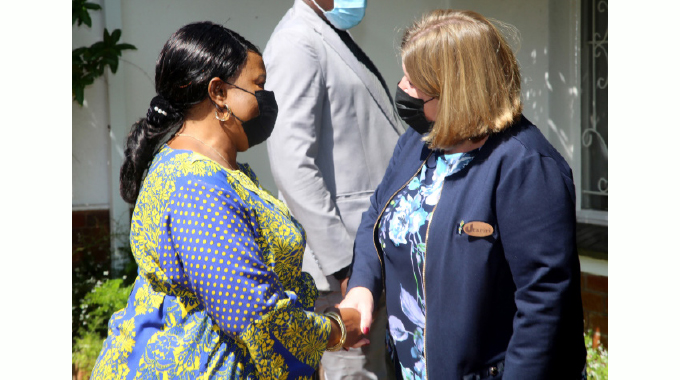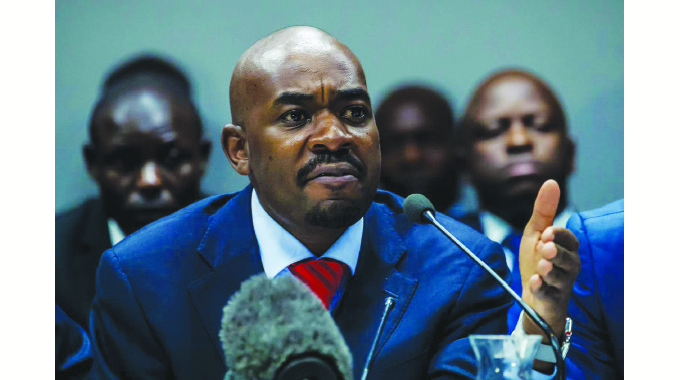First Lady leads in nature, wildlife preservation

Blessings Chidakwa-Herald Reporter
Efforts by Environment and Tourism patron Dr Auxillia Mnangagwa to preserve nature and wildlife, has seen her launching the Utariri Integrated Biodiversity Climate and Livelihoods Programme.
It aims to foster stewardship of biodiversity while ensuring communities economically benefit from their conservation and preservation efforts.
The climate crisis and biodiversity response programme, which is targeting to benefit communities residing along the Zambezi Valley, was launched by Dr Mnangagwa at the Swedish ambassador’s residence in Harare last Thursday.
The US$5,5 million programme funded by various development partners, including African Wildlife Foundation and Bushlife Africa Trust, has already started impacting lives of people in communities along the Zambezi Valley and other provinces.
The project is in line with the Government’s goals on biodiversity and climate change.
At a time of increasing human-wildlife conflicts and climate change, the project has seen communities receiving funds to start projects in horticulture and mushroom farming.
Dr Mnangagwa said this is the time to step up efforts to protect biodiversity, adding that the plan is to increase the scale and impact of environmental philanthropy.
She said the other goal was to partner with the most effective organisations and individuals to reduce the loss of species and ecosystems, while promoting the welfare of the people of Zimbabwe.
“It is an important and critical role because our earth is dying and in need of care. As the experts say, we are at the tipping point. I am amazed at how few (people) are fully aware of the importance of our biodiversity,” said Dr Mnangagwa. “For too long, we focused only on the economic merits of our heritage. Now, it is time to embrace it and make it a lifestyle.”
The First Lady thanked the management and team of the Swedish International Development Agency, the Utariri Consortium, community members representing different clusters within the Zambezi valley landscape, for launching the Utariri initiative. Dr Mnangagwa said Utariri lead partner, Danchurchaid director Mr Mads Lindegard, spoke of SDG17, which talks of partnerships.
She said by joining forces awareness would be increased on the importance of safeguarding the environment, which is the common future.
“A critical segment of this work is the youth, the future leaders of our country. We must be patient and teach them the importance of our natural resources, their heritage, so that they too can become Vatariri. Ultimately, we must leave no one behind.
“However, as the ambassador for wildlife, I am giving my firm commitment that I will not tire and it is my hope that this Utariri, biodiversity, climate change and livelihoods programme is here for the long haul,” she said.
Dr Mnangagwa said she would engage in various awareness campaigns even for those in rural areas, in human-wildlife conflict management, to ensure coexistence between humans and flora and fauna.
“This will include lessons on wild animal behaviour and how to pick key signals of communication from them for our safety as humans.
“I also intend to engage farmers to end river bank cultivation and deter them from deforestation of our wildernesses in an effort to clear land as vegetation is vital in curbing the effects of global warming,” she said.
The First Lady committed to reach small-scale miners on the hazards of river bank mining, and encourage sustainable practices of mining for the good of the environment.
But she conceded that the country cannot solve the challenges being faced overnight, hence the need to work with committed partners.
It is also hoped that funds would be cascaded beyond the Zambezi Valley, to other areas.

Guests watch a documentary during the Utariri Biodiversity, Climate Change and Livelihoods launch in Harare.
“We need to continue our efforts, now more than ever, to protect our planet. It is the responsibility of every single one of us to ensure the future of humanity and guard jealously our beautiful flora, fauna, and wildlife,” said Dr Mnangagwa.
Swedish Ambassador to Zimbabwe, Asa Pehrson, pledged support to conservation of natural resources.
“Your Excellency, I thank you for your engagement, insight and experience in this area. It will really be helpful for all of us and for this country.
“We are so glad and honoured by your presence, by your support and I think your presence together with high level representatives of Government and other key stakeholders indicates the importance and priorities that is given to the environment and climate in Zimbabwe,” she said.
Ambassador Pehrson said environment policy is a priority of the Swedish government, adding that they were excited and welcomed the opportunity to work with the Government and development partners.
A traditional leader, Chief Chundu, born Abel Mbasera, said back in the days, traditional cultural practices were aimed at safeguarding biodiversity and the environment.
“Our elders gave us totems because they wanted to preserve animals. That is why animals were protected for a long time, but now our children are poaching,” he said.
Chief Chundu said in the past, they would also protect forests, making sure they held traditional courts under trees.
“Trees were sacred and we would get medicines. We had different fruit trees which were consumed by humans and wildlife. We would make powder from fruits.
“We would also not burn grass; one would be penalised for doing that. Let us assist each other to replant all species of trees,” he said.
Chief Chundu said yesteryear rivers used to be full of water as there was no cultivation on stream banks.
People would also do fishing in rivers, but that has been slowly fading, said the traditional leader.
He called on EMA to step in as some people are mining along rivers.
“We should learn to live in harmony with nature,” he said.
A Mbire Ward 2 community scout, Ms Edith Jone, said she was inspired by her father who was a game scout.
Ms Jone said her father was a hardworking man, protecting villagers from being attacked but was unfortunately killed in 2010 by a lion while on duty.
“This inspired me to follow his footsteps. I was the only woman selected in my ward when we were recruited as rangers. We started as five women scouts in Mbire district but we are now 20. We were taught at Mushandike Wildlife.
“Through the support l received, l am now able to lead a dignified life, looking after my family and paying fees for my children,” she said.
A villager, Ms Judith Chipangura of Alpha Village, Nyamakate, Ward 7, who benefitted from a garden project, said the Utariri initiative was a game-changer.
“I am a widow and have five children and 16 grandchildren. I am now leading a better life following the initiative.
“I grow cabbages, onions, carrots and tomatoes. With my first produce l managed to earn about US$700,” she said.
Another beneficiary, Ms Elizabeth Sibanda (48), said people were always looking down upon her.
“We were assisted with a fenced garden as women and received farming inputs. This has reduced domestic violence even in our homes as we no longer beg for money from our spouses.
“In fact our husbands are the ones begging us. Apart from financial emancipation, my family is now affording to eat a healthy meal.
“It is commendable that communities in affected areas have been doing their best to live in harmony with wild animals,” said Ms Sibanda.
Chief Director for Environment, Climate and Meteorological Services, Professor Prosper Matondi, applauded Dr Mnangagwa and development partners for the work they do to preserve nature.
To capture the beauty of nature, Hope Masike fused mbira with a poem.











Comments